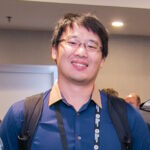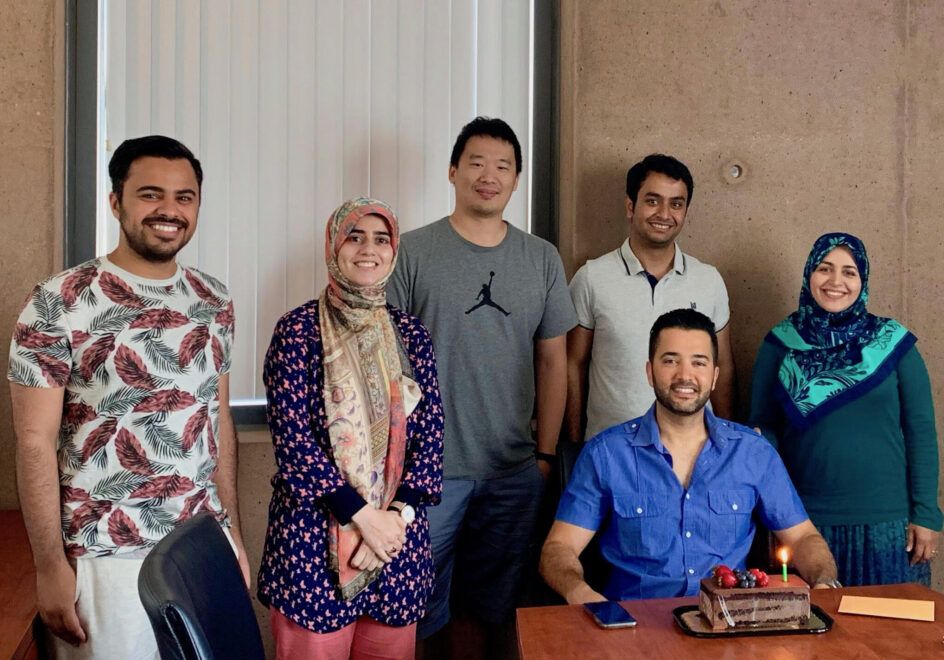Alumni Spotlight: Game Play Sparks Software Engineering Career for Jun-Wei Lin

As a young teenager in Taiwan, Jun-Wei Lin enjoyed playing King of Kings, a MUD [multi-user dungeon] text-based online game. But the game was more than just a pastime. It sparked a fascination with computing that put Lin on the path to becoming a software engineer.
Lin went on to earn bachelor’s and master’s degrees in computer science from National Tsing Hua University, and he landed an IT job in government. Then, in 2013, he enrolled in the Ph.D. program at National Taiwan University. While at NTU, he joined an interdisciplinary research project called i5k Workspace@NAL and became a research intern at the National Agriculture Library in Maryland. He helped build a data hub and software tools for bioinformatics scientists to submit, search, visualize and annotate insect genome data. After the internship, he returned to Taiwan and decided to transfer to UC Irvine, where — advised by Professor Sam Malek — he earned his Ph.D. in software engineering from the Donald Bren School of Information and Computer Sciences (ICS).
Here, Lin talks about his journey from playing games in Taiwan to becoming a Site Reliability Engineering team member for MGM Resorts International.
What first sparked your interest in computer science?
During middle school, I became captivated by a MUD, a text-based online multiplayer game, which was my initial exposure to the wonders of computers. The ability to explore and construct virtual worlds on the internet with the aid of some commands fascinated me. As I became more involved with the game, I also taught myself how to build a website to share game data and walkthroughs. The process of designing and implementing this website, as well as receiving positive feedback from fellow gamers, was a catalyst for my interest in the practical and engineering aspects of computer science.
What led you to UCI for your Ph.D.?
I was drawn to UCI for my Ph.D. due to its exceptional reputation for research and comprehensive curriculum in software engineering. As a top-ranked university in this field, UCI offers one of the few Ph.D. programs in software engineering, which is further supported by its outstanding faculty. The program boasts a group of excellent and active professors who consistently publish in top venues and impart their expertise through specialized courses in this discipline. Additionally, the allure of the Southern California weather made it an irresistible choice for a software engineering researcher seeking a paradise in which to conduct research.

Can you talk about your work at MGM?
As a member of MGM’s Site Reliability Engineering (SRE) team, my primary responsibility is to ensure consistency, availability and observability of our digital services. During my on-call shifts, I promptly assess and prioritize critical incidents, engage cross-functional teams as needed and collaborate with them to address the issue quickly. During periods when I am not on call, I focus on developing tools that enhance the reliability of our services, optimize our alert monitoring, and automate the provisioning, configuring and troubleshooting of our cloud infrastructure.
What do you like best about working at MGM?
I appreciate MGM’s team-oriented and welcoming work culture that values diversity and encourages open communication. Additionally, my position on the SRE team provides me with a holistic and end-to-end view of how different services, including in-house and third-party ones, are connected and streamlined as software systems and applications used by millions of people.
You’re also a best-selling author! Can you talk about your Python book?
The Python book [in Chinese] I have authored caters to entry-level programmers interested in web scraping with Python. It covers the basics, including working with libraries and APIs, data storage and text encoding, while delving into advanced topics like handling forms and login pages. Furthermore, the book employs real-world examples that readers in Taiwan can easily relate to. The use of practical examples and extensive coverage of the topics set this book apart from others.
Any words of advice for ICS students working toward a career in software engineering?
It’s essential to put in a dedicated effort and prioritize the basics. While advancements in AI and tools such as ChatGPT or Copilot might seem concerning, it’s important to stay composed. These technological advancements are unlikely to replace skilled engineers with a strong knowledge foundation, sound judgment and acute perception. Instead, they can assist in enabling you to outperform those who might lack these qualities.
How is your ICS education helping you in your work?
My doctoral program in ICS has equipped me with valuable critical and analytical thinking skills, which have proven advantageous in my professional work. These skills allow me to deconstruct complex problems and systems into smaller, more manageable components, facilitating incident root cause analysis and process improvement to deliver business value. Additionally, the communication training I received during graduate school, particularly in written communication, has enabled me to communicate effectively as a developer. Clear and concise writing is essential in today’s hybrid or remote work environment.
More generally, my experience as a Ph.D. student at UCI was truly transformative and invaluable. The academic journey allowed me to delve deeply into ideas, unconstrained by the usual limitations of the business world, such as time pressures or shifts in the market. I had the opportunity to follow my imagination and collaborate with brilliant minds who have helped me bring my ideas to fruition. My time at UCI was life-changing, and I am grateful for the chance to have pursued my passions in such a supportive and intellectually stimulating environment.
— Shani Murray